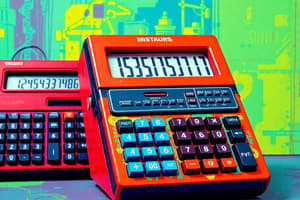Podcast
Questions and Answers
Which of the following devices was the first electronic digital computer?
Which of the following devices was the first electronic digital computer?
- Atanasoff-Berry-Computer (ABC) (correct)
- ENIAC
- Turing Machine
- Harvard Mark I
Who developed the hypothetical Turing machine, which would be designed to perform logical operations and could read and write?
Who developed the hypothetical Turing machine, which would be designed to perform logical operations and could read and write?
- Alan Turing (correct)
- John W. Mauchly
- Howard Aiken
- J. Presper Eckert, Jr.
What was the first computer designed and sold commercially, specifically for business data-processing applications?
What was the first computer designed and sold commercially, specifically for business data-processing applications?
- EDVAC
- ENIAC
- EDSAC
- UNIVAC I (correct)
Who invented the transistor in 1947?
Who invented the transistor in 1947?
What was the first stored-program computer, built by Maurice V. Wilkes?
What was the first stored-program computer, built by Maurice V. Wilkes?
What was the first counting device?
What was the first counting device?
Who developed the first integrated circuit, or chip, in 1959?
Who developed the first integrated circuit, or chip, in 1959?
Who invented the first mechanical digital calculator using gears?
Who invented the first mechanical digital calculator using gears?
Who used punch cards to automate a weaving loom?
Who used punch cards to automate a weaving loom?
What did Charles P. Babbage design to perform repeated calculations automatically?
What did Charles P. Babbage design to perform repeated calculations automatically?
Who suggested using a binary system for storage instead of a decimal system?
Who suggested using a binary system for storage instead of a decimal system?
Who introduced the first electromechanical, punched-card data-processing machine used for the 1890 U.S. census?
Who introduced the first electromechanical, punched-card data-processing machine used for the 1890 U.S. census?
Flashcards are hidden until you start studying




